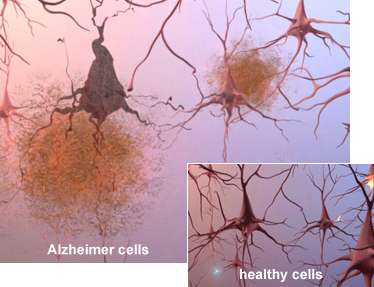
Is this what dementia/Alzheimer's really is?
According to recent research published in the magazine ‘Neurology’, long term higher blood sugar levels have a profoundly negative influence on cognition, which the researchers believe is “possibly mediated by structural changes in learning-relevant brain areas.” In other words, there’s a link between sugar consumption and Alzheimer’s and dementia.
It’s becoming increasingly clear that the same pathological process that leads to insulin resistance and type 2 diabetes may also lead to dementia. As you over-indulge on sugar and grains, your brain becomes overwhelmed by the consistently high levels of insulin and eventually shuts down its insulin signaling, leading to impairments in your thinking and memory abilities, and eventually causing permanent brain damage.
In his book, ‘Grain Brain’ Dr Perlmutter stresses that gluten sensitivity is involved in most chronic disease, including those affecting your brain, because of how gluten affects your immune system. Unfortunately, many people, physicians included, still believe that if you don’t have celiac disease or digestive symptoms, gluten is fair game and you can eat as much of it as you like. Full-blown celiac disease, which is an extreme form of immune-mediated gluten sensitivity primarily affecting the small intestine, affects an estimated 1.8 percent of people in Western cultures. But non-celiac gluten sensitivity may actually affect as much as 30 to 40 percent of all people, and according to Dr. Alessio Fasano at Massachusetts General Hospital virtually all of us are affected to some degree.
This is because we create something called zonulin in the intestines in response to gluten. These difficult to digest proteins known as prolamines, found in wheat, barley, and rye, make your gut more permeable, which allows undigested proteins to get into your bloodstream that would otherwise have been excluded. That then sensitizes your immune system and promotes inflammation and autoimmunity tendencies.
According to Dr. Perlmutter, much of our current disease burden stems from the fact that we are contaminating our immune systems with proteins to which the human immune system has never, in the history of humankind, been previously exposed.
This is because we create something called zonulin in the intestines in response to gluten. These difficult to digest proteins known as prolamines, found in wheat, barley, and rye, make your gut more permeable, the ‘leaky gut’, which allows undigested proteins to get into your bloodstream that would otherwise have been excluded. This then sensitizes your immune system and promotes inflammation and autoimmunity tendencies.
Lifestyle strategies that promote neuro-genesis and re-growth of brain cells include the following
- Reduce (non-vegetable) carbohydrate consumption, including sugars and grains. Increase healthy fat consumption.
- Increase your omega-3 fat intake and reduce consumption of damaged omega-6 fats (think processed vegetable oils) in order to balance your omega-3 to omega-6 ratio. I recommend Igennus ethyl-EPA 90% concentration of omega 3 fatty acids to reduce the omega 6 Arachadonic Acids causing so much inflammation. www.igennus.com
- Exercise – Physical activity produces biochemical changes that strengthen and renew not only your body but also your brain—particularly areas associated with memory and learning.
- Reduce overall calorie consumption, including intermittent fasting.
.All of these strategies target a specific gene pathway called BDNF or brain-derived neuro-trophic factor, which promotes brain cell growth and connectivity as demonstrated on MRI scans (as exemplified by the work of Professor Basant Puri at the Hammersmith Hospital London and now at Imperial College). So if you’re looking for the most straightforward way to lower your risk of dementia, including Alzheimer’s, this is the plan to follow. As you’ll notice, a great deal of the plan involves modifying your diet to lower unhealthy carbohydrates, refined sugars and increase healthy fats.
